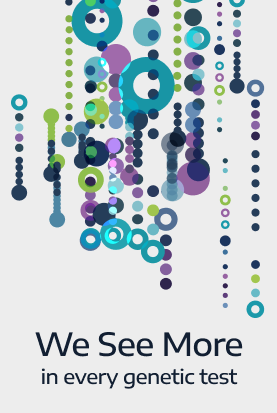Genomic Unity® Pediatric Hematologic Disorders Analysis
Genomic Unity® Pediatric Hematologic Disorders Analysis is a diagnostic test designed to identify genetic variants associated with hereditary hematologic cancers, bone marrow failure, and immunodeficiency disorders.
- Test Description
- When to Order
- Included Genes
- Included Analyses
- Turnaround Time
- Sample Types
- CPT Codes
- Methods and Limitations
Test Description
Genomic Unity® Pediatric Hematologic Disorders Analysis is a targeted test that uses a whole genome platform to detect all major clinically relevant variant types from a single sample. This targeted test focuses on 140 genes associated with hereditary hematologic cancers, bone marrow failure, and immunodeficiency disorders.
Genomic Unity® Pediatric Hematologic Disorders Analysis provides a single, unified clinical report that replaces a battery of tests including: targeted gene panel, single gene analysis, and multiplex ligation dependent probe amplification (MLPA).
When to Order
Order this test when clinical symptoms are consistent with hereditary hematologic cancer, bone marrow failure, or immunodeficiency, or when there is a family history.
Included Genes
ACD, AK2, ALAS2, ANKRD26, AP3B1, ATG2B, ATM, BLM, BRCA1, BRCA2, BRIP1, BTK, CARD11, CARMIL2, CASP10, CASP8, CBL, CD27, CD40LG, CD70, CEBPA, CLPB, CSF3R, CHEK2, CTC1, CTLA4, CTPS1, CXCR4, DKC1, DNAJC21, DOCK8, EFL1, ELANE, ERCC6L2, ERG, ETV6, FADD, FANCA, FANCB, FANCC, FANCD2, FANCE, FANCF, FANCG, FANCI, FANCL, FAS (TNFRSF6), FASLG, FCHO1, G6PC3, GATA1, GATA2, GFI1, GSKIP, HAX1, IKZF1, IL2RA, IL2RB, ITK, JAGN1, JAK2, LIG4, LYST, LZTR1, MAGT1, MBD4, MCM4, MECOM, MLH1, MPIG6B, MPL, MSH2, MSH6, NBN, NF1, NHP2, NOP10, PALB2, PARN, PAX5, PGM3, PIK3CD, PIK3R1, PMS2, PRF1, PRKCD, PTPN11, RAB27A, RAC2, RAD51, RAD51C, RAF1, RASGRP1, RBBP6, RHOH, RIT1, RMRP, RPL11, RPL15, RPL23, RPL26, RPL27, RPL31, RPL35A, RPL5, RPS10, RPS17, RPS19, RPS24, RPS26, RPS27, RPS28, RPS29, RPS7, RTEL1, RUNX1, SAMD9, SAMD9L, SBDS, SH2B3, SH2D1A, SHOC2, SLX4, SMARCD2, SOS1, SRP72, STAT3, STK4, STXBP2, TERC, TERT, THPO, TINF2, TP53, TPP2, UBE2T, VPS45, WRAP53, XPC, ZNF341
View a list of cancers associated with each gene.
Included Analyses
- Sequence analysis of hereditary hematologic cancer-associated genes including: single nucleotide variants, deletions, insertions, and characterized intronic variants.
- Copy number variant analysis of hereditary hematologic cancer-associated genes including: duplications/deletions, mobile element insertions, and inversions.
Optionally includes:
- Reflex to Genomic Unity® Exome Analysis, Genomic Unity® Exome Plus Analysis, or Genomic Unity® Whole Genome Analysis.
- Genomic Unity® Pharmacogenomics Analysis
Turnaround Time
A report will be issued within 2 weeks. Turnaround time begins when samples and all required documents and approvals are received.
Note: If a skin biopsy sample is submitted, a report will be issued within 4-6 weeks.
Sample Types
Note: For individuals with active disease or those who have had an allogeneic bone marrow/stem cell transplant, skin biopsy is advised.
CPT Codes
81441
The CPT codes provided are for informational purposes only. CPT coding is the sole responsibility of the billing party. Please direct any questions regarding coding to the payer being billed.
Methods and Limitations
Genomic Unity® Pediatric Hematologic Disorders Analysis uses a PCR-free whole genome sequencing (WGS) platform paired with our Genomic Intelligence® analytical software.
SNVs:
99.9% sensitivity
99.9% specificity
99.8% positive predictive value
Structural variants:
96% clinical sensitivity
Test limitations:
The PMS2 gene (exons 13-15) contains regions that are non-unique, therefore not all variants can be assigned to the correct location, limiting interpretation. The CEPBA, DNAJC21, and RUNX1 genes are not fully covered by this test, therefore there may be variants in certain regions of these genes that are not identified. Performance characteristics were not determined for the Boland inversion, therefore it may not be detected.
